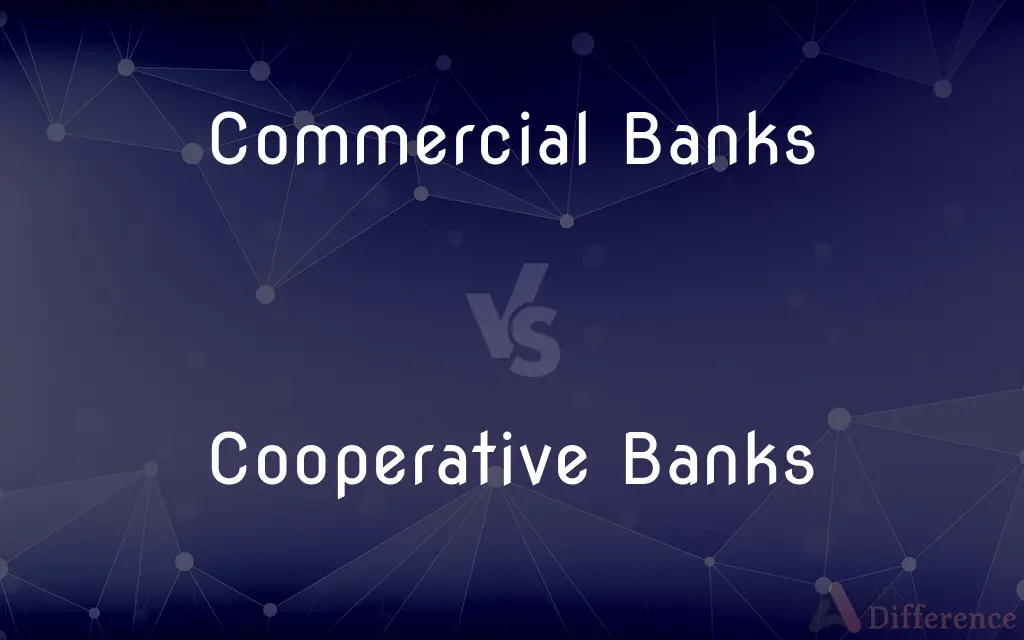Commercial Banks vs. Cooperative Banks — What's the Difference?
Edited by Tayyaba Rehman — By Fiza Rafique — Published on December 11, 2023
Commercial banks are profit-driven entities owned by shareholders, while cooperative banks are member-owned institutions focused on service.

Difference Between Commercial Banks and Cooperative Banks
Table of Contents
ADVERTISEMENT
Key Differences
Commercial banks are financial institutions that offer a wide range of banking services to the general public and businesses, aiming to maximize profits for their shareholders. Cooperative banks, on the other hand, are owned and controlled by their members, with a focus on providing banking services to their member-owners.
Commercial banks typically offer a broad spectrum of financial products, including loans, savings accounts, and investment services. They operate on a large scale and may have an international presence. Cooperative banks are usually smaller, community-oriented institutions that prioritize the financial well-being of their members over maximizing profits.
Commercial banks are governed by a board of directors and management team that makes decisions based on the interests of shareholders. Cooperative banks are democratically controlled by their members, who have a say in the bank’s policies and decision-making processes.
Commercial banks often have more resources and capabilities to invest in technology and innovation, which can lead to a wider range of services and products. Cooperative banks may have limited resources but provide personalized service and community-focused banking solutions.
Commercial banks are primarily regulated by national and international banking authorities, ensuring their operations align with broader financial market standards. Cooperative banks are also regulated, but their structure and principles align with cooperative values and community needs.
ADVERTISEMENT
Comparison Chart
Ownership
Owned by shareholders
Owned by members
Profit Orientation
Profit-driven
Service-oriented
Decision Making
Decisions made by management and shareholders
Decisions made democratically by members
Scale of Operation
Often large, sometimes international
Usually smaller, community-focused
Primary Objective
Maximizing shareholder value
Meeting member needs and fostering community
Compare with Definitions
Commercial Banks
A bank that is operated for the purpose of making a profit.
Commercial banks often have multiple branches in different cities.
Cooperative Banks
A bank that operates for the benefit of its members.
As a member, she had a say in the cooperative bank's policies.
Commercial Banks
A financial institution that offers services like loans, deposits, and currency exchange.
Most people have an account in a commercial bank for daily transactions.
Cooperative Banks
A bank focusing on community development and member service.
The cooperative bank sponsored a local school event.
Commercial Banks
An entity that provides financial services to businesses and individuals for profit.
She secured a loan from a commercial bank to start her bakery.
Cooperative Banks
A member-owned financial cooperative.
Cooperative banks often offer lower loan rates to their members.
Commercial Banks
A banking institution that provides services like savings accounts, mortgages, and personal loans.
He refinanced his home through a commercial bank.
Cooperative Banks
A financial institution owned and controlled democratically by its members.
The cooperative bank held an annual meeting for all members.
Commercial Banks
A regulated institution offering a variety of financial services.
Commercial banks are subject to strict regulatory oversight.
Cooperative Banks
A banking entity that prioritizes members’ interests over profits.
Cooperative banks often have a loyal member base.
Common Curiosities
Who owns cooperative banks?
They are owned by their members or customers.
What are cooperative banks?
Member-owned banks prioritizing service over profit, often community-focused.
What is the main goal of commercial banks?
To maximize profits for shareholders.
What is the main goal of cooperative banks?
To serve their members and support the community.
Who owns commercial banks?
They are owned by shareholders and investors.
How do cooperative banks support communities?
By offering affordable services and investing in local initiatives.
Do cooperative banks offer the same services as commercial banks?
They offer many similar services but might have fewer options.
What are commercial banks?
Financial institutions focused on profit, offering services like loans and deposits.
Are commercial banks internationally present?
Many have international operations.
Can anyone join a cooperative bank?
Generally, yes, but some have specific membership criteria.
How do commercial banks generate income?
Through interest, fees, and various financial services.
Who governs cooperative banks?
Their members, through a democratic process.
Are cooperative banks profit-driven?
No, they focus on member service rather than profit.
Who governs commercial banks?
A board of directors and management team.
Are commercial banks bigger than cooperative banks?
Often, yes, as they usually operate on a larger scale.
Share Your Discovery

Previous Comparison
King Cobra vs. Indian Cobra
Next Comparison
FDI vs. FIIAuthor Spotlight
Written by
Fiza RafiqueFiza Rafique is a skilled content writer at AskDifference.com, where she meticulously refines and enhances written pieces. Drawing from her vast editorial expertise, Fiza ensures clarity, accuracy, and precision in every article. Passionate about language, she continually seeks to elevate the quality of content for readers worldwide.
Edited by
Tayyaba RehmanTayyaba Rehman is a distinguished writer, currently serving as a primary contributor to askdifference.com. As a researcher in semantics and etymology, Tayyaba's passion for the complexity of languages and their distinctions has found a perfect home on the platform. Tayyaba delves into the intricacies of language, distinguishing between commonly confused words and phrases, thereby providing clarity for readers worldwide.












































